sql jion
A Visual Explanation of SQL Joins
I thought Ligaya Turmelle's post on SQL joins was a great primer for novice developers. Since SQL joins appear to be set-based, the use of Venn diagrams to explain them seems, at first blush, to be a natural fit. However, like the commenters to her post, I found that the Venn diagrams didn't quite match the SQL join syntax reality in my testing.
I love the concept, though, so let's see if we can make it work. Assume we have the following two tables. Table A is on the left, and Table B is on the right. We'll populate them with four records each.
id name id name -- ---- -- ---- 1 Pirate 1 Rutabaga 2 Monkey 2 Pirate 3 Ninja 3 Darth Vader 4 Spaghetti 4 Ninja
Let's join these tables by the name field in a few different ways and see if we can get a conceptual match to those nifty Venn diagrams.
SELECT * FROM TableA INNER JOIN TableB ON TableA.name = TableB.name id name id name -- ---- -- ---- 1 Pirate 2 Pirate 3 Ninja 4 Ninja Inner join produces only the set of records that match in both Table A and Table B. |
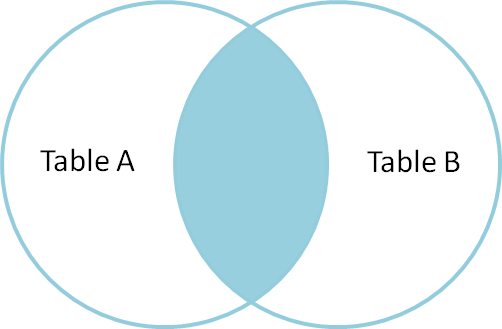 |
|
SELECT * FROM TableA FULL OUTER JOIN TableB ON TableA.name = TableB.name id name id name -- ---- -- ---- 1 Pirate 2 Pirate 2 Monkey null null 3 Ninja 4 Ninja 4 Spaghetti null null null null 1 Rutabaga null null 3 Darth Vader Full outer join produces the set of all records in Table A and Table B, with matching records from both sides where available. If there is no match, the missing side will contain null. |
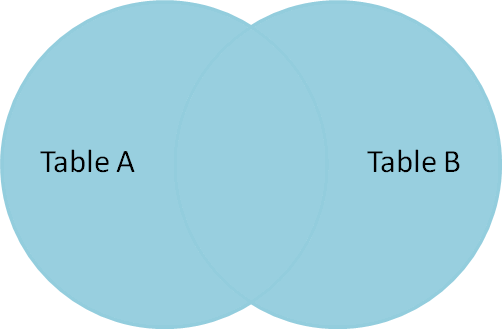 |
|
SELECT * FROM TableA LEFT OUTER JOIN TableB ON TableA.name = TableB.name id name id name -- ---- -- ---- 1 Pirate 2 Pirate 2 Monkey null null 3 Ninja 4 Ninja 4 Spaghetti null null Left outer join produces a complete set of records from Table A, with the matching records (where available) in Table B. If there is no match, the right side will contain null. |
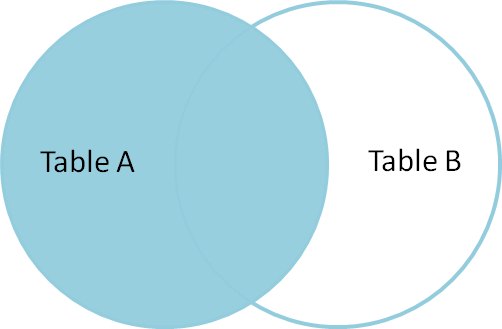 |
|
SELECT * FROM TableA LEFT OUTER JOIN TableB ON TableA.name = TableB.name WHERE TableB.id IS null id name id name -- ---- -- ---- 2 Monkey null null 4 Spaghetti null null To produce the set of records only in Table A, but not in Table B, we perform the same left outer join, then exclude the records we don't want from the right side via a where clause. |
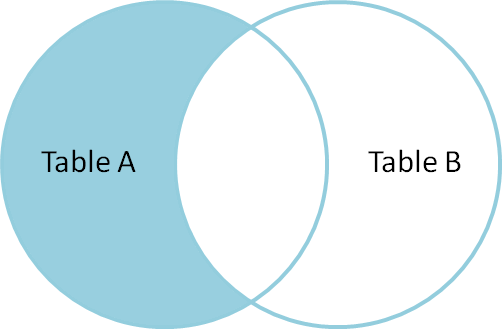 |
|
SELECT * FROM TableA FULL OUTER JOIN TableB ON TableA.name = TableB.name WHERE TableA.id IS null OR TableB.id IS null id name id name -- ---- -- ---- 2 Monkey null null 4 Spaghetti null null null null 1 Rutabaga null null 3 Darth Vader To produce the set of records unique to Table A and Table B, we perform the same full outer join, then exclude the records we don't want from both sides via a where clause. |
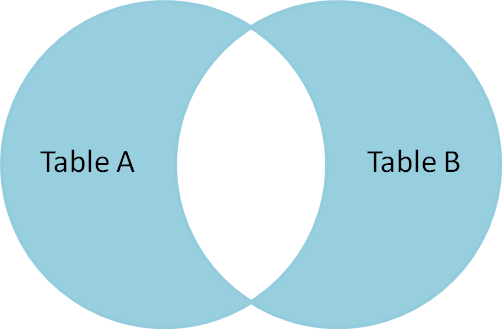 |
There's also a cartesian product or cross join, which as far as I can tell, can't be expressed as a Venn diagram:
SELECT * FROM TableA CROSS JOIN TableB
This joins "everything to everything", resulting in 4 x 4 = 16 rows, far more than we had in the original sets. If you do the math, you can see why this is a very dangerous join to run against large tables.
对于SQL的Join,在学习起来可能是比较乱的。我们知道,SQL的Join语法有很多inner的,有outer的,有left的,有时候,对于Select出来的结果集是什么样子有点不是很清楚。Coding Horror上有一篇文章(实在不清楚为什么Coding Horror也被墙)通过 文氏图 Venn diagrams 解释了SQL的Join。我觉得清楚易懂,转过来。
假设我们有两张表。
- Table A 是左边的表。
- Table B 是右边的表。
其各有四条记录,其中有两条记录是相同的,如下所示:
id name id name -- ---- -- ---- 1 Pirate 1 Rutabaga 2 Monkey 2 Pirate 3 Ninja 3 Darth Vader 4 Spaghetti 4 Ninja
下面让我们来看看不同的Join会产生什么样的结果。
SELECT * FROM TableA INNER JOIN TableB ON TableA.name = TableB.name id name id name -- ---- -- ---- 1 Pirate 2 Pirate 3 Ninja 4 Ninja
Inner join
产生的结果集中,是A和B的交集。
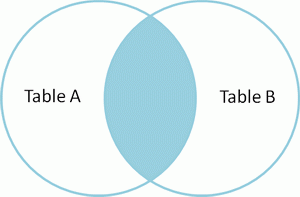
SELECT * FROM TableA FULL OUTER JOIN TableB ON TableA.name = TableB.name id name id name -- ---- -- ---- 1 Pirate 2 Pirate 2 Monkey null null 3 Ninja 4 Ninja 4 Spaghetti null null null null 1 Rutabaga null null 3 Darth Vader
Full outer join 产生A和B的并集。但是需要注意的是,对于没有匹配的记录,则会以null做为值。
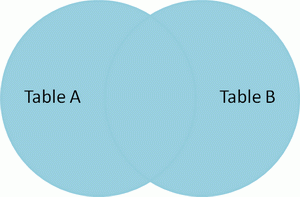
SELECT * FROM TableA LEFT OUTER JOIN TableB ON TableA.name = TableB.name id name id name -- ---- -- ---- 1 Pirate 2 Pirate 2 Monkey null null 3 Ninja 4 Ninja 4 Spaghetti null null
Left outer join 产生表A的完全集,而B表中匹配的则有值,没有匹配的则以null值取代。
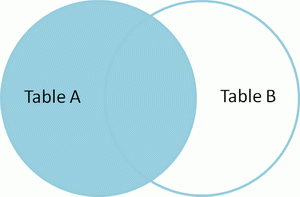
SELECT * FROM TableA LEFT OUTER JOIN TableB ON TableA.name = TableB.name WHERE TableB.id IS null id name id name -- ---- -- ---- 2 Monkey null null 4 Spaghetti null null
产生在A表中有而在B表中没有的集合。
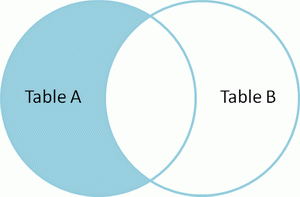
SELECT * FROM TableA FULL OUTER JOIN TableB ON TableA.name = TableB.name WHERE TableA.id IS null OR TableB.id IS null id name id name -- ---- -- ---- 2 Monkey null null 4 Spaghetti null null null null 1 Rutabaga null null 3 Darth Vader
产生A表和B表都没有出现的数据集。
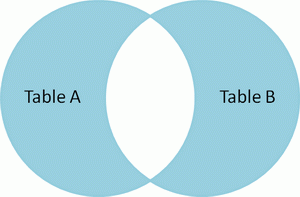
还需要注册的是我们还有一个是“交差集” cross join, 这种Join没有办法用文式图表示,因为其就是把表A和表B的数据进行一个N*M的组合,即笛卡尔积。表达式如下:
SELECT * FROM TableA CROSS JOIN TableB
这个笛卡尔乘积会产生 4 x 4 = 16 条记录,一般来说,我们很少用到这个语法。但是我们得小心,如果不是使用嵌套的select语句,一般系统都会产生笛卡尔乘积然再做过滤。这是对于性能来说是非常危险的,尤其是表很大的时候。
(全文完)




 浙公网安备 33010602011771号
浙公网安备 33010602011771号